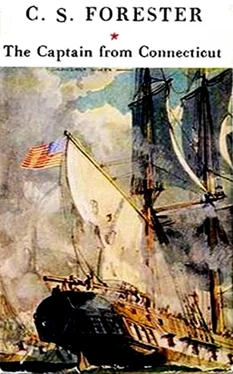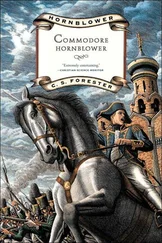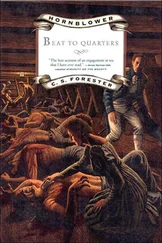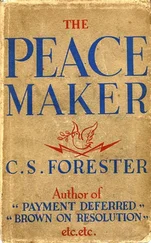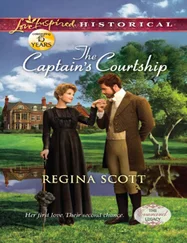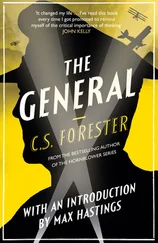“Has she changed course since you saw her?” he demanded of the lookout.
“No, sir, not as far as I can tell.”
Peabody glanced back over his shoulder again; the eastward sky was quite black. The Delaware’s upper sails, viewed from the brig, would not stand out in the fashion hers did, and there was not enough light from the westward to illuminate them, either. The chances were that the brig had not seen her, and moreover if she had she would probably have put up her helm and hurried over the horizon as a precautionary measure. His eyes sought her again unavailingly, for the red patch had dwindled almost to nothing and the brig had disappeared into the darkness.
“Mr. Hubbard!” he bellowed down to the deck.
“Sir!”
“Put the helm up. Bring her round on the other tack.”
“Aye aye, sir.”
Far below him he could hear the orders called, and he could just hear the bustle of the men hurrying to the braces. The Delaware rose momentarily to an even keel beneath him, and then heeled again. The darkness round him was filled with the creaking of ropes as the yards came round. As he looked forward he saw the starboard foretopmast studdingsail blot out the last of the red patch of sky. The foretopsail followed round.
“Keep her at that!” he roared.
“Aye aye, sir!”
Now the Delaware had the wind nearly abeam, while the brig to leeward had been close hauled. The courses of the two ships were sharply convergent. Two hours, two hours and a half, perhaps, before they met—always provided, that is, that the brig did not alter course. But although Peabody strained his eyes peering into the night he could see nothing of her at all. He was about to descend, when he remembered the good services of the lookout.
“A tot of rum for you to-morrow,” he said.
“Thank’ee, sir. Please, sir——”
“Well?”
“Beg your pardon, sir, but could you make it ’baccy? A plug o’ chawing, sir——”
“Yes. What’s your name?”
“Gaines, sir.”
A seaman who preferred tobacco to rum was quite a rarity. Perhaps he had been through the same desperate struggle that Peabody had, when every nerve in his body shrieked for the drink he denied it. Peabody had won his victory over the monster as a lieutenant of twenty, after he realised that in the wardroom mess his behaviour, which he had thought so clever, was like that of his mother when she was wearing her stupid grin. There had been three months of torment, three years of temptation. Now even the temptation was gone, and Peabody could trust himself to have one drink, two drinks, when the occasion demanded, but perhaps this man Gaines was still in the period of temptation. He looked over the starboard sky, somehow oddly moved, and then he realised that he was in danger of having a favourite on board, which would not do at all. He grunted something inarticulate, swung himself into the rigging, and began his slow descent. Murray was officer of the watch now, but Hubbard was still on deck with him awaiting his captain.
“Send the hands to quarters, Mr. Murray, and clear for action.”
The drums which had beaten so merry a tune an hour ago now went roaring through the ship calling the men to quarters. The Delaware was filled with the clatter and bustle of it all as the men rushed to begin their allotted tasks, and the weeks of drill during those grim days in the East River were justified now as even in the darkness the men did their work without confusion. The marines climbed to the tops with elephantine clumsiness; the powder boys came running to the guns with their buckets of cartridges. Down below the bulkheads were coming down, the guns were being cast loose, the sand was being scattered over the deck. Rodgers the boatswain formed up his two fire-fighting parties with the head pumps fore and aft and the canvas hoses coiled in the scuppers. Two boys hurried along the deck with their arms full of lanterns, hanging them on the gant lines which Rodgers had set up.
“I don’t want a light in the ship until I give the word.”
“Very good, sir.”
The main-deck guns were being run out with a threatening rumble—the distant thunder of the approaching storm—while on the spar deck the crews of the carronades adjusted their pieces for elevation and primed the vents. The Delaware was singing through the sea; running thus, two points free, was perhaps her best point of sailing, and there was most decidedly a chance that she would pass ahead of the quarry.
“Get the stuns’l in, Mr. Hubbard.”
“Aye aye, sir.”
There was not much chance of danger. A brig-rigged vessel even if she were a man-of-war, was bound to be smaller than a big frigate like the Delaware; if she were part of a convoy the escort would have been to windward of her and in plain sight. She must be sailing alone, and in that case she might be perhaps an American privateer or one of those footy little British Post Office packets. Peabody called up before his mind’s eye the memory of those topsails silhouetted against the sky. Yes. The chances were that she was a Post Office packet, and in that case she must be overwhelmed before she could throw her mail bags overside. Yet at the same time he must be quite certain that she was not an American privateer; it would be disastrous if she were and he fired into her.
Peabody remembered the British naval officers whom he had encountered often enough in the cafés of Valetta. Many of them spoke in a curious throaty manner which he had been given to understand was looked upon nowadays as the newest fashion in England, with the vowels broadened and the consonants disregarded. He thought for a moment of Hubbard, but Hubbard’s South Carolinian speech had nothing British about it. He turned upon Jonathan.
“Go and find O’Brien for me. Master’s mate—he’ll be at the headsail sheets.”
It was five long minutes before O’Brien came looming up on the quarterdeck; it was a pity that Jonathan had not yet familiarised himself with every part of the ship and every man on board.
“O’Brien, sir. Come to report.”
O’Brien’s voice had not lost the Irish in it, even though it was twenty years since he had sailed from Cork.
“Stay by me. I want you to hail for me when the time comes.”
The night was clear although dark; the crescent moon, right down on the horizon, contributed almost no light, but the stars were bright. A ship could be seen at a couple of miles, certainly.
“Cover that binnacle light,” said Peabody.
The Delaware surged along through the darkness; it was fortunate that he had been able to spare the studding sails, because the reduction in speed would make a considerable difference to the visibility of her bow wave. There came a low hail from the foretop—the sergeant of marines there must be an intelligent man as well as having keen eyes.
“Deck, there! She’s in sight, sir. On the larboard bow.”
Peabody put down his night-glass—the thing was not of much use. There she was, most certainly, a black outline faintly showing against the slightly lighter surface of the sea, holding the same course as when he had seen her last, and the two vessels were closing fast. In five minutes—but she was wearing round on the instant.
“Loose the stuns’ls, Mr. Hubbard, if you please. Put your helm up a point, quartermaster.”
Peabody had caught sight of the first movement of the brig’s sails as she wore. The fact that her foretopsail came round before the mainsails proved that she had a small crew and was no man-of-war, and it also gave the Delaware two full minutes in which to cut the corner. She was tearing down upon the brig now.
“Pass the word to the starboard guns to stand by.”
A faint hail came from the brig.
“Ship ahoy! What ship’s that?”
Читать дальше
